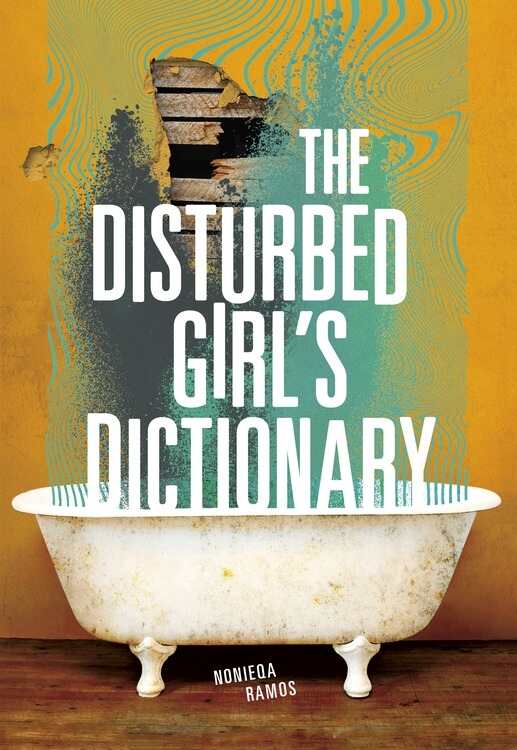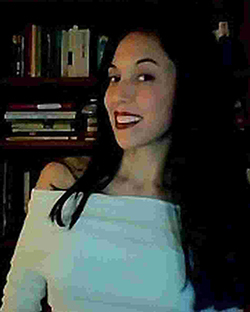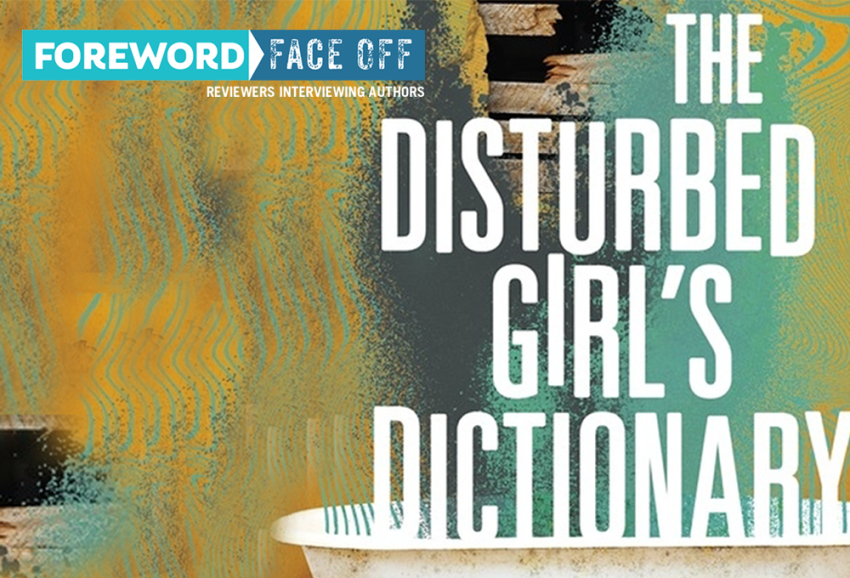Reviewer Goes Deep with NoNieqa Ramos, Author of The Disturbed Girl’s Dictionary
Be you Republican or Democrat or cocker spaniel, you’ll likely agree that society has a couple sacred obligations—one of which is to do everything possible to protect children from physical and sexual violence. Not that the United States does it very well, especially in impoverished, drug- and crime-infested areas, but as a society, we cringe in horror when confronted with the brutal reality of life at the margins. And then we look away—while life goes on for those victimized, innocent children.

In The Disturbed Girl’s Dictionary, NoNieqa Ramos jerks our attention back, but her protagonist Macy is so compelling, you’ll find it impossible to avert your gaze. Here’s what Foreword reviewer Letitia Montgomery-Rodgers had to say about the YA novel in her starred review: “Macy’s charisma is riveting. … Again and again, she directly addresses readers and slaps down assumptions. A study in contradictions, she insists on her world’s complexity, and she’s right. The story jukes and jinks and demands you follow. … The result is a harrowing, heartbreaking tour de force, a story of will and determination against all odds.”
The following conversation between Letitia and NoNieqa breaks new ground for these Face Off interviews. We’re honored to share it with you.
The “We Need Diverse Books” campaign has a strong presence in YA lit. Meeting Macy Cashmere in The Disturbed Girl’s Dictionary felt like a moment of homecoming and reckoning. There’s so much about Macy’s experience that’s rich, textured, detailed, and particular. Could you reflect a bit on how your own experiences and identities intersected with Macy’s creation?
Macy embodies the voices of the many children I’ve encountered as a teacher and prior foster parent. These kids are in the labyrinth: Their monsters are real. I’ve fostered kids whose only possessions were the clothes on their back and the worn flip-flops disintegrating on their feet. I’ve taught kids who had to do barbecues and car washes to raise money for funerals.
My foster daughter D.L’s parents shaved her head with garden tools because they got tired of treating her head lice. Her mom chopped potatoes while her boyfriend broke D.L’s arm. But those were the facts, not the stories. The true story was that D.L still knew to hold my 5-year-old daughter’s hand when they crossed the street.
Fact: My foster son M.J was a thirteen-year-old already on probation for theft and recreational drug use. Fact: He had driven a truck through a wall in his grandparent’s house. True story: M.J. would spend hours pushing his one-year-old foster brother, J., in a box around the living room because it made J. laugh and laugh.
The fact is, many of my students, my foster kids, were disowned, neglected, abandoned, abused. The true story was they were still writing theirs.

What about my own experiences? My own complicated relationship with my mother certainly informed Macy’s story. My own family’s struggle to rise up and out of poverty and those who fell through the cracks gives me empathy.
I’ve touched upon the struggle. Then, there’s the other side of Macy, the escapades and hijinks. Macy climbing a gutter to cut off the cable. Macy taping her breasts together.
See, I grew up reading and watching white kid after white kid having escapades and hijinks. White kids escapades and hijinks is a whole freakin’ genre unto itself. Remember Dennis the Menace? But where was Benito the Menace? Or J’quan the menace? I mean, as a kid I did some majorly stupid shit. Macy, and all the Macy’s of the world, are entitled to be three-dimensional. They are entitled to do some majorly ridiculous shit just like everybody else.
But, of course, there’s more to Macy’s hijinks than that. She’s a sociologist. A feminist. A prophet.
Macy Cashmere is an absolutely riveting character. She’s so original, completely herself, and clearly the engine that makes The Disturbed Girl’s Dictionary go, so I hope you don’t mind if we discuss her in some detail. Macy has a lot of rage. When reading the novel, Macy’s rage seemed completely earned while also being a shorthand for her equivalent sorrow. Why was it important for you to represent and honor Macy’s rage?
Originally, my opening quote for TDGD was Dylan Thomas’s “Rage against the dying of the light.” The title of Mark Oshiro’s new book, Anger Is a Gift, is a good place to begin discussing Macy’s rage. Sometimes, sorrow is rage with her hands tied behind her back. Rage is sorrow with one hand raised to block, and one hand striking a blow.
Rage can be blind and primal. Rage, as you said PERFECTLY, can be shorthand for sorrow. Rage can be fuel. Rage is illuminating—for the character and the reader.
Macy knows there’s a power in naming, and it’s not just in the words used but in who’s defining and using them: hence, Macy’s dictionary. In the novel, there are things you name and things you don’t. For instance, you use the word “disturbed” in reference to Macy, but you never name her ethnicity. Likewise, while Macy lives in urban poverty, the geographic location isn’t specified. How did you choose what to name and what to include as subtext?
You are the only person who has brought these things up! Interestingly, readers have identified Macy as Puerto Rican or black. I don’t identify her ethnicity for many reasons. Too often (always?) poverty is automatically associated with Persons of Color and is an indictment of Persons of Color. Instead of examining context, history, and hegemony, we blame melanin, DNA, and biology. That any child lives in abject poverty should be an indictment of society, not of ethnicity. The only time I discuss ethnicity or culture is in the context of history or triumph. Every day that a kid like Macy still has love in her heart is a triumph.
I didn’t want to name a specific city or neighborhood for the same reasons—and also because I wanted kids to say that’s my neighborhood, that’s my life, and have them all be right. I was trying to create the universal out of particulars.
Maybe, influence from literary god Gabriel Garcia Marquez had something to do with my naming and unnaming as well.
If it’s not clear already, I’ll come out and say this novel is very complex. There’s a lot Macy grapples with, and the book deftly avoids neat answers. Several things seem open-ended, including the story’s satisfying conclusion, but one thing that’s stuck with me is Macy’s relationship with her friend Alma. Issues of gender presentation and sexuality seem to be part of their relationship’s texture, especially in the ways their emerging identities seem to differ. Could you unpack this for me a little more?
Funny, but I almost need Macy to write another dictionary to define her sexuality. A part of Macy is shielding herself from sexual predation by hiding in her sweatshirt. Another part is eschewing the body, the flesh, in favor of the soul (Alma). In the timeline of the book and unbeknownst to herself, Macy is somewhere between a gray ace and a demisexual. Can you imagine Macy’s first kiss?
The novel showcases the amazing internal resources Macy has. In order to survive, she’s had to develop a range of intelligences and competencies, yet she has a very complex, adversarial relationship to school. So often, education is hailed as the panacea for social ills, yet Macy isn’t well-served by the educational system. Neither are her friends—a potential valedictorian and a person who’s mentally-divergent. This is bold commentary from someone who’s herself highly educated and an educator. What do you hope to bring to light in this critique?
Education saved me. Education could save Macy. But education—understaffed, under-resourced, overworked educators, cannot be the only answer. I have worked with saints. In all my years as a public educator, almost every one of my colleagues (Shout out to Erica Almaraz, Collete Knight, and Irene Medillin, etc.) were highly-qualified, dedicated, and passionate about their students’ success. This book isn’t a critique of education.
It’s a critique of the unreasonable weight we place on educators and Child Protective Services. (Bear in mind, that Macy’s view of educators and CPS is skewed.) But the truth remains, this country doesn’t have its damn priorities straight.
Today, February 15th, we are mourning the dead in yet another school shooting. School cannot protect children against the violence our government enacts against its people with institutionalized racism and sexism; with corporate interests held above the interests of our environment, our children; with the lives of whites, particularly white males, as inherently more important than anyone else’s.
Oh, my dear Alma. I mourn her loss too. I envision Macy on a quest to find her and save her from her uncle. I was very intentional in having a beautiful, bright, promising young lady end up as a victim of rape and sexual slavery. We live in rape culture. Well before I became published, this has been a subject of my work. Sexual abuse is—hopefully was—a rite of passage for women. How many women, girls, do you know that have been harassed, abused? With Alma, I wanted to mourn and critique the fact that no matter how educated, how accomplished, how talented, women are still not safe.
Letitia Montgomery-Rodgers

